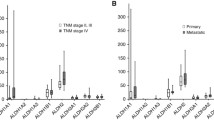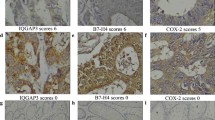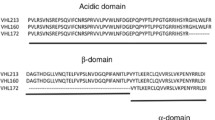Abstract
The early diagnosis of colorectal cancer (CRC) is important because it is one of the most readily curable of all cancers, if detected early. However, the sensitivity of current markers is low. Immunostaining intensity for the monoclonal antibody Hb3 in CRC cell lines and tissues was stronger than in controls. Interestingly, this was associated with a low level of tumor differentiation. We used Hb3-coupled affinity chromatography to search for a corresponding Hb3 antigen as a candidate biomarker for early detection, and identified a Rho GTPase activating protein 6 (RhoGAP6) isoform 1 variant as an Hb3 antigen by mass spectrometry. Using reverse transcription polymerase chain reaction and western blot analysis, we confirmed that the expression levels of this variant were elevated in aberrant cells and tissues. Thus, the RhoGAP6 isoform 1 variant might serve as a biomarker for the development and progression of CRC.





Similar content being viewed by others
Abbreviations
- CRC:
-
Colorectal cancer
- RhoGAP6:
-
Rho GTPase activating protein 6
- mAb:
-
monoclonal antibody
- MALDI-TOF MS:
-
Matrix assisted laser desorption ionization time-of-flight mass spectrometry
References
Ferlay J, Autier P, Boniol M et al (1999) Estimates of the cancer incidence and mortality in Europe in 2006. Ann Oncol 18:581–592
Sung JJ, Lau JY, Goh K, Leung W (2005) Increasing incidence of colorectal cancer in Asia: implications for screening. Lancet Oncol 6:871–876
Kievit J (2002) Follow-up of patients with colorectal cancer: numbers needed to test and treat. Eur J Cancer 38:986–999
Cheah PY (2009) Recent advances in colorectal cancer genetics and diagnostics. Crit Rev Oncol Hematol 69:45–55
Spano JP, Milano G, Vignot S, Khayat D (2008) Potential predictive markers of response to EGFR-targeted therapies in colorectal cancer. Crit Rev Oncol Hematol 66:21–30
Le Tourneau C, Vidal L, Siu LL (2008) Progress and challenges in the identification of biomarkers for EGFR and VEGFR targeting anticancer agents. Drug Resist Updat 11:99–109
Spano JP, Lagorce C, Atlan D et al (2005) Impact of EGFR expression on colorectal cancer patient prognosis and survival. Ann Oncol 16:102–108
Flamini E, Mercatali L, Nanni O et al (2006) Free DNA and carcinoembryonic antigen serum levels: an important combination for diagnosis of colorectal cancer. Clin Cancer Res 12:6985–6988
Eschrich S, Yang I, Bloom G et al (2005) Molecular staging for survival prediction of colorectal cancer patients. J Clin Oncol 23:3526–3535
Sun QB, Ho JJ, Kim YS (1986) Human colonic cancer associated antigens detected by three monoclonal antibodies. Chin Med J 99:63–74
Fu YN, Sun QB (1988) Effect of monoclonal antibody on human colorectal cancer cells. Aizheng 7:331–334
Wang CL, Guo M, Sun QB, Lin HX, Bi QS (1989) Targeted therapy for colorectal cancer using monoclonal antibody-ricin A chain. Bull Human Med Univ 14:107–110
Zhang J, Wang CL, Sun QB et al (1990) Radio immunoimaging study with 131I-labeled anti-colorectal carcinoma monoclonal antibody in nude mouse model. Bull Human Med Univ 15:235–238
Hu JY, Su JZ, Pi ZM, Zhou JG, Sun QB (1998) Radioimmunoimaging of colorectal cancer using (99m)Tc labeled monoclonal antibody. World J Gastroenterol 4:303–306
Van Aelst L, D’Souza-Schorey C (1997) Rho GTPases and signaling networks. Genes Dev 11:2295–2322
Ochocka AM, Grden M, Sakowicz-Burkiewicz M, Szutowicz A, Pawelczyk T (2008) Regulation of phospholipase C-[delta]1 by ARGHAP6, a GTPase-activating protein for RhoA: possible role for enhanced activity of phospholipase C in hypertension. Intl J Biochem Cell Biol 40:2264–2273
Prakash SK, Paylor R, Lamarche-Vane N et al (2000) Functional analysis of ARHGAP6, a novel GTPase-activating protein for RhoA. Hum Mol Genet 9:477–488
Schaefer L, Prakash S, Zoghbi HY (1997) Cloning and characterization of a novel rho-type GTPase-activating protein gene (ARHGAP6) from the critical region for microphthalmia with linear skin defects. Genomics 46:268–277
Moon SY, Zheng Y (2003) Rho GTPase-activating proteins in cell regulation. Trends Cell Biol 13:13–22
Burridge K, Wennerberg K (2004) Rho and Rac take center stage. Cell 116:167–179
Durkin ME, Yuan BZ, Zhou X et al (2007) DLC-1: a Rho GTPase-activating protein and tumour suppressor. J Cell Mol Med 11:1185–1207
Potter JD (1999) Colorectal cancer: molecules and populations. J Natl Cancer Inst 91:916–932
Liu XF, Zhu SG, Zhang H et al (2006) The methylation status of the TMS1/ASC gene in cholangiocarcinoma and its clinical significance. Hepatobiliary Pancreat Dis Int 5:449–453
Kim JC, Roh SA, Lee KH et al (2005) Genetic and pathologic changes associated with lymphovascular invasion of colorectal adenocarcinoma. Clin Exp Metastasis 22:421–428
Author information
Authors and Affiliations
Corresponding author
Rights and permissions
About this article
Cite this article
Guo, F., Liu, Y., Huang, J. et al. Identification of Rho GTPase Activating Protein 6 Isoform 1 Variant as a New Molecular Marker in Human Colorectal Tumors. Pathol. Oncol. Res. 16, 319–326 (2010). https://doi.org/10.1007/s12253-009-9226-1
Received:
Accepted:
Published:
Issue Date:
DOI: https://doi.org/10.1007/s12253-009-9226-1




